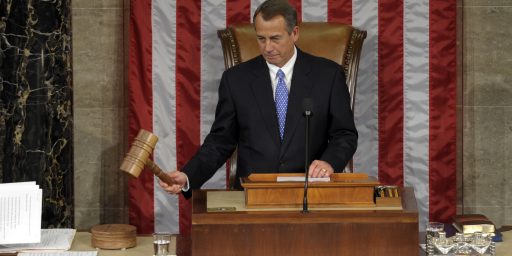Is the System Broken?
Did the debt ceiling debate reveal dysfunctional government?
 The headline question arises from a McClatchy story via the Miami Herald: Don’t pop any champagne corks: Debt deal shows broken system.
The headline question arises from a McClatchy story via the Miami Herald: Don’t pop any champagne corks: Debt deal shows broken system.
In fairness, the headline of the piece does not entirely comport with the contents of the piece,which focuses far more on the political dynamics of the moment, rather than the question of where the system is broken (this is not unusual, as the authors of newspaper stories do not write the headlines*).
The main point of the linked piece can be summed up as follows:
the spectacle that was Washington over the last month is more about the great chasm between the two major parties than about the performance of Obama, Boehner or individual members.
“The parties are as far apart as they’ve been since reconstruction,” said Edwards at Texas A&M. “There are very few people in the middle. It’s very hard to compromise. And there are personal animosities. The Republican Party, for example, is more Ann Coulter than Ronald Reagan. It is very much harder.”
I would add: the entire situation is complicated by the fact that the House GOP at the moment is functioning more like a coalition than a unified political party. The Tea Party faction has a near-veto on what the caucus does, meaning that Boehner has to appease them. This makes legislating all the more difficult and blunts the traditional power of being in the majority in the House.
To the question of whether the system is broken, as I think a lot of people are going to make this claim this week, the answer to the question is: no, the system is not broken. Legislating is still possible.** Even if the deal fails, this does not mean that the system it broken, although such an outcome may raise questions of the intelligence/sanity of our legislators.
While there are a number of reforms that I would like to see to our political institution,*** we cannot claim that the system does not function. True breakdown would manifest in various ways, such as actors failing to engage in negotiations or simply refusing to vote, or by actors doing things that was clearly in violation of the constitution. None of these things are happening. In fact the machine of government has been in furious motion for days.
Indeed, rather than the system being broken, we are seeing bicameralism and separation of powers in action.
BTW: such observations are not an endorsement of the way things have played out, nor is it to be construed as any specific reaction to the deal. Rather, I would note that many who will claim that the system is “broken” will do so because they do not like the outcome. Yet, dissatisfaction with outcomes is not proof of dysfunction.
Rather, as per the McClatchy story cited above, and the excerpted portion in particular: the issue at the moment is based in politics and the conflict between (and within) the parties. And that conflict is a reflection of variety of factors, including confusion in the public over what it really wants from government, as well as conflicts between various large interests in our society who know exactly what they want.
—
*I can personally attest to this fact. I have written dozens of pieces for the Mobile Press-Register and the Birmingham News and think maybe once did the editor use my suggested title for the piece. And several times the headline chosen did not reflect my goals for the column.
**Granted, at the moment, the compromise has yet to pass Congress.
***Most of which are fantasies, such as changing our electoral system, so I won’t engage in that discussion at the moment.





Completely agreed. The system is fine. It’s politics that’s broken, the natural outcome of radicalization.
Steven, really excellent analysis that brings a lot of the heated rhetoric back to earth.
I think the greatest measure of how badly things are “broken” is the missed opportunity. In other words what we got, or are getting, versus what was at one point possible.
@hey norm: Yes, but possible in what sense? In a hypothetical sense or in a practical sense.
Surely the measure of what was actually possible is ultimately found in the outcomes, not in terms of what might have been, yes?
I do wonder, however, whether a bicameral system with a strong system of checks and balances, both formal and informal, can work in conjunction with a tight party discipline model and a team concept. I’m all in favor of a moving center that has to be found on an issue-by-issue basis. But, if the minority party can dominate the system by holding its breath and holding the process hostage by simply never compromising, the system can’t function.
Here’s my measure of whether the system is broken or not. Look at, given the makeup of the House and the Senate, the respective bills they would have been likely to pass, averaged their cuts and tax increases to get a final bill, and maybe (or maybe not) give a tiny bit more to the Senate side since there’s a Democrat in the White House. This is obviously a hypothetical exercise, with a lot of error bars around it, but I think it’s roughly possible. Then, compare that hypothetical deal with what we are poised to actually get. The difference represents the extent to which a comparatively small group can use parliamentary tricks to extract huge concessions.
@James Joyner: I think this is a legitimate question. However, that then becomes a critique (in my mind) of strong bicameralism and and sep of powers as a mode of governance. I still say that the machine is working as designed. If, however, the machine is not suited to the task at hand, then the machine needs reworking.
I do agree that situations when the minority can act as a veto is a serious problem (which is whay I favor filibuster reform). However, that wasn’t the problem here, but rather the ability of a minority faction to hold a majority party hostage. The weird thing in this whole exercise has been the weakness of House Leadership, which usually is in a position of power in these types of situations.
@Fargus:
Yes, but if one can use parliamentary tricks, then that is part of the system. In other words, it is not that the system is broken, it is that the system doesn’t work the way you want it to work. To me, that it is an importance distinction.
Part of my point is that I do not think one can claim a system is “broken” just because it produces undesirable outcomes.
Dr. Taylor –
What is broken isn’t the political system, but the media system. We’ve created a world where both sides have to be treated equally.
Certain GOP Reps say “The Sky is Red”. (an obvious lie)
Dems say “The Sky is Blue”. (an obvious truth)
CNN, ABC, CBS, NBC say “Policitians disagree on color of sky” rather than “One side is batshit crazy and lying to you.”
A few examples:
Death Panels
Cutting Taxes increases jobs and grows the economy.
Immigrants are the cause of our economic problems.
There is no such thing as global warning.
The earth is only 6000 years old.
It’s okay if the US defaults on it’s loans. That won’t hurt us.
Obama is responsible for all the debt the USA has. George Bush is responsible for none of it.
And, all the while, guys like Doug and James, enable the crazies in their party.
Here’s a fact that many of the right side of the aisle choose to ignore: President Clinton gave GW Bush SURPLUSES as far as the eye could see. A GOP congress with a GOP president created deficits as far as the eye could see. Yet somehow, it’s all Obama’s fault.
While President Bush was in office, “deficits didn’t matter”, per VP Cheney. Now, with Obama in office, we “must cut spending”.
What a bunch of hypocritical a**holes.
Sure, I get that distinction. Is it working as designed versus is this how we want it to be designed in the first place. I guess I’d argue less that this has been an example of how the system was designed to work, and more an example of an undesirable outcome that the system wasn’t designed to guard against.
EddieinCA has it nailed. Even though James is now calling the crazies what they are, it took years for him to get here, and the media still won’t do it.
We are now in a world where NBC, CBS, ABC, and CNN are effectively more right-wing than a Republican blogger.
It certainly didn’t blunt the Republicans’ power in this specific deal. The end deal has almost nothing in it for Democrats other than the fact that the Republicans didn’t get EVERYthing they wanted, just most of it.
@SLT…exactly my point…the delta between what was possible in Bowles-Simpson Commision/Gang of Seven/Boehner-Obama negotiations (all pretty much the same) and the actual outcome is the measure of how badly things are broken.
@EddieInCA: Are you off your meds again?
@hey norm: That assumes a particular outcome is necessary to say whether the machine works or does not.
” The system is broken” is a convenient way of absolving anyone of responsibility. Its the equivalent of “mistakes were made.”
The “political system” is nothing more than human actors making willful decisions.
In this case, a group of people decided that they were willing to let an economic catastrophe happen unless they got their way.
Another person decided to save the economy rather than risk that.
“The system is broken” and “both sides do it” is a way of hiding that basic fact.
@Steven L. Taylor:
I think what norm is saying is that the resulting legislation should be representative of the balance of ideological makeup of the members in Congress. If it is wildly unrepresentative of said makeup (i.e., a dem senate and rep house passing a bill that is 95% republican), then the system is broken.
@Ben: My basic retort would be: who ever said that the system we have was designed to produce outcomes that directly reflected the exact ideological makeup of Congress?
@Pete:
The fact that you chose to attack me, rather than respond to the substantive point, says a whole lot about you.
Thanks for playing.
@ SLT…not a particular outcome. An outcome that produces tangible objectively positive results versus an outcome that produces tangible objectively negative results.
@Pete:
Pete, that’s what I was thinking too, after reading this:
It’s like looking down and calling it up.
@Steven L. Taylor:
And I guess my point is, if I’m just going to get Republican laws no matter whether I vote for a Democrat or a Republican, then what’s the point in voting?
@Steven L. Taylor: Not that it should represent the ideological makeup directly, no. But that that ideological makeup should have an influence on the legislation to say the least. For instance, in the Senate, it won’t necessarily be the direct ideological makeup of the body reflected in legislation, but the ideology of the controlling party colored by the preferences of the 60th most liberal or conservative Senator in the body. The House would be similar, except that you just have to pass the halfway mark. Then you’ve got to consider that in giving concessions to the 58th, 59th and 60th Senators, you may lose the support of the 1st, 2nd and 3rd. Then you have to make allowances for each body catering somewhat to what they know will pass the other, and what the President will pass.
I see no case to be made that such a consideration, based on the ideology of the deciding votes in each chamber, would net us a bill so hugely conservative as the one we seem to have gotten.
@hey norm:
According to whom, Norm, and by what measure?
@Fargus: Here’s the thing, though: the design of the Senate (and then its own internal rules) lead it to be more conservative than it might otherwise be. That’s the system working as designed, not being broken. This is a fundamental part of my point: we must distinguish between “broken” and “working properly but producing sub-optimal results”–the solutions are different depending on which assessment is correct.
I would love to see Senate reform, but not because it is broken, but rather I don’t like the way it functions when it it working the way it is designed.
@Fargus:
It is all about leverage, Fargus.
When you say “conservative,” do you mean “conservative” as in the current political ideology, or as in “resistant to change”? On the second I’d agree with you, and on the first, I wouldn’t completely. I see the Senate as a body whose own Byzantine rules make it resistant to change, but not which would make it predisposed to the current political incarnation of conservatives, especially in this debt ceiling debate, since what they’re backing is a pretty radical change.
@Fargus:
Senate rules favor whichever voting block is the most obstructionist, obstinate, and willing to go farther and longer in the game of chicken.
@Fargus: I meant “conservative” as in “resistant to change.”
But the spending cuts they passed are pretty draconian, and an obvious break with current trajectory. Wouldn’t you say that in this case, that’s not the conservative side? If not, I’d be interested to hear why.
@Steven L. Taylor:
In what way was was the Senate “designed” to require 60 votes to agree that it really is Monday afternoon? That isn’t a design feature, it is a bug – a flaw that was never intended to be used as it is being used now.
@SKI: The filibuster is part of the traditions that I noted in some comment above. I never stated that the Senate was designed for 60 votes.
However, even without the filibuster, the design of the Senate is fundamentally conservative because of the 2 Senators per state.
Depends on how you define “the system.” The legislative process, I think, could stand some reform but isn’t fundamentally broken. The problem with the debt ceiling just exacerbated the tension between the different factions, because the stakes in this case were really high. The primary problem here is that the only real method of accountability for Congress is for the electorate to vote them out, but that’s not going to happen until long after the crisis is over, and memories tend to be pretty short. Does anyone think our so-called liberal media is going to challenge anyone’s record well enough to hold any of these jokers accountable?
But if you define “the system” as our politics, I think it is broken, in the sense that EVERYTHING is politicized in a hyper-partisan manner. Things like criticizing Michelle Obama for going barefoot in the White House. Ridiculous, and yet it’s given oxygen in the right wing media.